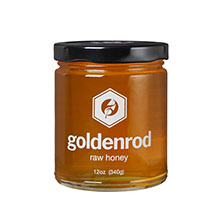A Beekeeper's Journal: Raw Honey Harvest
October 11, 2023
by Martine Gubernat

The Collection Process
July was very hot and humid in New Jersey; consequently, the main sources of nectar — flowering trees — have long since passed their peak, and the few remaining plant flowers are not adequate enough to sustain large colonies.When we pulled frames of honey to extract last month, we left sufficient amounts of honey in the hives for the bees to eat (beekeepers cannot be greedy!) in order to get them through the late-summer nectar dearth until the fall nectar flow from knotweed and goldenrod begins in our area.
Honey bees, however, are compulsive hoarders who will collect as much nectar or honey as possible from any local source, including robbing it from other nearby hives. Like most thieves, they prey on the weak who are unable to fight back which, in the honey bee world, means a weak colony. Once the forager bees pick up on the sweet smell of honey — made even more fragrant by the heat of summer — they follow the delectable scent to a nearby hive.
Bee Pirates
Typically, a strong hive is secured from invaders by their guard bees, but a weak hive might not have enough of those defenders to prevent the looters from entering the hives, chewing open the capped honey cells, and stealing the sweets. The robber bees fill their honey stomachs with that liquid gold and then fly back to their own hives with the stolen goods. If the robbing continues, the weak hive could collapse, meaning that the queen will either abscond or die, and the remaining bees will leave the colony and, if they are lucky, merge with another.Unfortunately, our Hive #1 had became the victim of this pirating. The hive had been very robust throughout June and July, so when we saw bees gathering on the landing board at the bottom entrance, we assumed that they were “bearding,” which is a hot-weather behavior that includes clustering around the hive entrance and fanning their wings to increase air flow into the hive.
Sadly, we were wrong. When we opened the hive to evaluate the bees, we noticed that virtually all of the frames in the top boxes — the place where the honey is stored — had been chewed open and were empty of honey. We were not only surprised, but we also felt guilty for not noticing that the colony had grown too weak to defend itself from being robbed.
Prevention
We did a thorough check of the other hives to make sure that they each had a queen as well as a robust and healthy colony of honey bees. Fortunately, none of the other seven colonies in our apiary had been looted, which means that they were strong enough to defend against robbers (and may, in fact, have been doing some or all of the robbing from Hive #1).Additionally, we made sure that there were no gaps between the boxes where robber bees could enter. We will continue to monitor the hives throughout August and evaluate colony strength in order to deter honey theft as the summer dearth continues. If necessary, we may have to feed the bees to get them through until the fall nectar flow begins.
